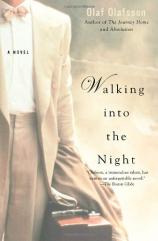Walking Into the Night
Review
Walking Into the Night
Olaf Olafsson doesn't have to write books. At 42, he is the CEO of Time Warner Digital Media and the founder of Sony Interactive Entertainment; he lives in a triplex in Manhattan and owns a home in his native Reykjavik, Iceland. Olafsson, son of prolific and highly regarded Icelandic writer Olafure Sigurdsson, did not study literature or writing; instead, he attended Brandeis University on a Wien Scholarship and studied positron physics. Olafsson is the embodiment of what so many writers say: that they didn't choose writing, writing chose them.
From his novels (which include ABSOLUTION and THE JOURNEY HOME), it seems that Olafsson also doesn't choose his stories; they choose him. What could be further from Olafsson's privileged existence than the character of Disa in THE JOURNEY HOME, an Icelandic woman who has lived for years in England and must travel back to her native land to resolve a personal riddle? And yet Olafsson, too, is a willing exile, which perhaps explains part of the pull of the story behind his latest novel, WALKING INTO THE NIGHT.
Christian Benediktsson is William Randolph Hearst's butler at San Simeon, the media mogul's vast California seaside estate. The Icelandic native is a controlled, controlling staff member whose sole pleasure seems to be sketching wild birds in his rare free hours. He caters to his employer's every whim. But when one of Hearst's fixations threatens Benediktsson's position, the butler finds himself increasingly obsessed with his own shadowy past.
As the novel opens, Benediktsson has related --- candidly, we presume --- the history of his marriage to wife Elisabet and the story of their family back in Iceland. However, as Hearst's life and empire begin to fray around the edges, Benediktsson's own frayed memories surface --- his affair in New York with Klara, a Swedish dancer; his abandonment of Elisabet and their children; and his many errors in judgment that lead him to become a butler.
Benediktsson's voice is as flat and toneless as one would expect from a man who has severed all ties with his past. Interestingly enough, this character is based on a real person who did in fact abandon his family and work as a butler, although probably not for Hearst. That man's grandson confirms his grandfather's stolid demeanor: "We called him 'Sitting Bull,'" he says. In real life, as in the novel, this man is "outed" by an act of heroism --- he wound up back with his family not because he wanted to be found, but because he was found by a fluke. (Of course, one could argue that his heroism was subconsciously motivated by a wish to be found. . .)
While the voice has authenticity, it lacks the force of Disa's. The reader is left to wonder whether the flatness is the point (if a man chooses to throw away his family, is he an empty shell?), or if Olafsson simply found it too difficult to sustain the story of a man who doesn't want to tell it in the first place.
Reviewed by Bethanne Kelly Patrick on January 24, 2011
Walking Into the Night
- Publication Date: October 12, 2004
- Genres: Fiction
- Paperback: 272 pages
- Publisher: Anchor
- ISBN-10: 1400034809
- ISBN-13: 9781400034802




